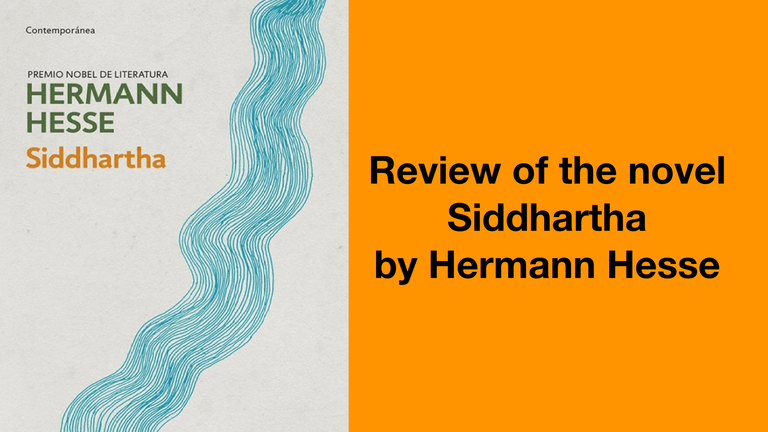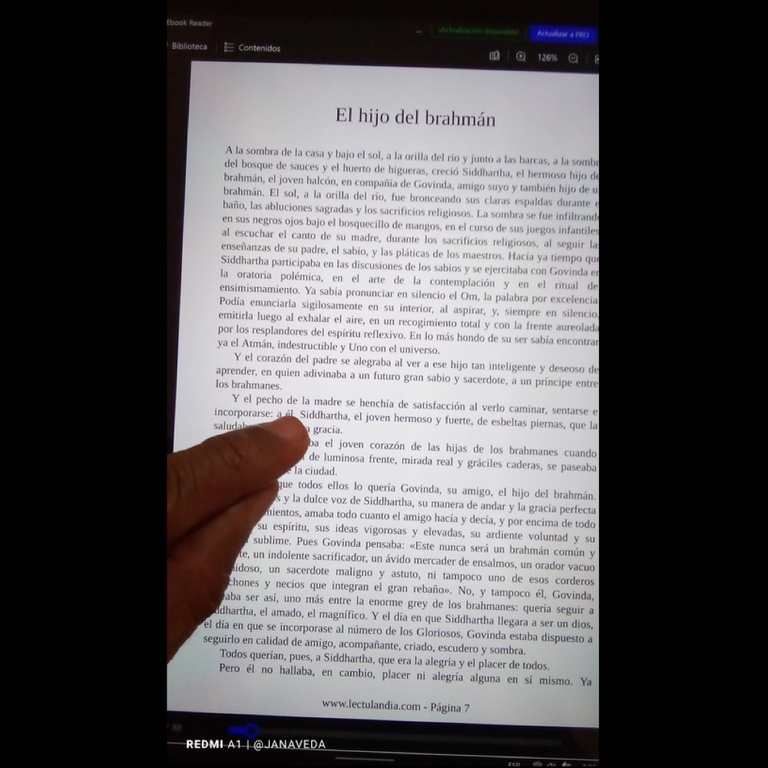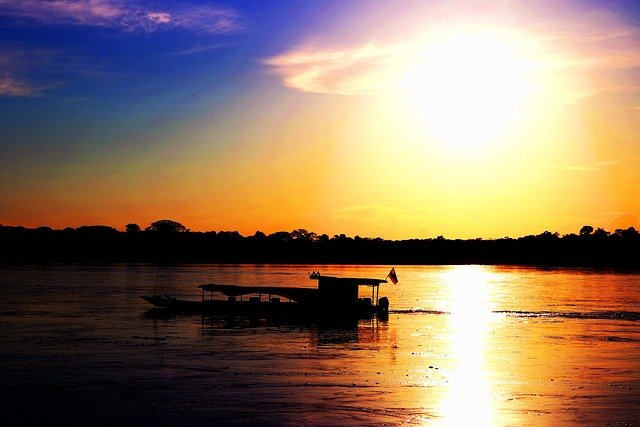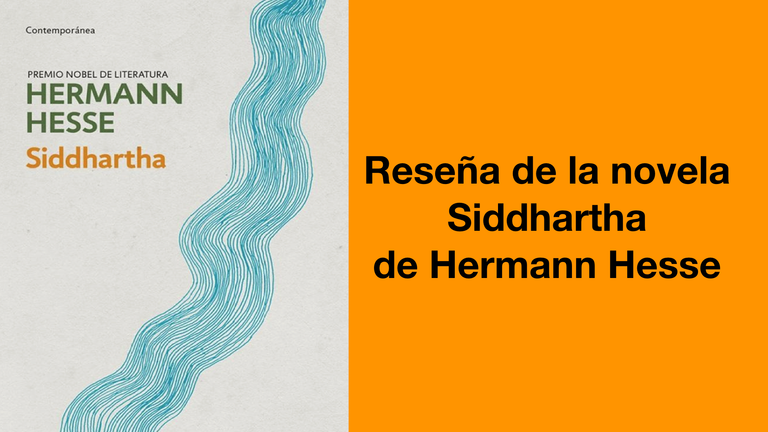

First, I wish you a happy and prosperous 2025, especially one full of reading and fantastic books. Well, today I bring you the comments of my first book read of the year, yesterday, Epiphany. You know, I have a list of at least seventy books that I am interested in reading before 2026, of course, with God's permission, and that, for sure, will increase with your recommendations. That book was the short novel Siddhartha by Hermann Hesse.
A literary work already a hundred years old, since it was published in 1922. I don't know how I waited so long to enjoy it. Yes, yesterday I couldn't stop reading it. Its eighty pages, so well written in Spanish by the hand of Juan José del Solar, alienated me from the world and calmed me from tragic family news.
Perhaps, I am still under its fascinating influence, but I think it is a must-read for those who are in a permanent search for the meaning of life. So I am thrilled and surprised to have immersed myself in the thoughts and ideas of its author, who was awarded the Nobel Prize for Literature in 1946.

At first, I thought it was a historical novel, inspired by the life of the Buddha, Siddhartha Gautama, but I was wrong. Of course, it uses the historical context, but with a different Siddhartha: an invented one. A protagonist, who subtly interacts with the representation of the Enlightened One, whom Hesse, through a play on words, calls Gotama. Great!
You can see where this is going! Excuse the expression. Even more so when the novel's core is centered on the spiritual with a tendency to the mystical, in questions that many of us ask ourselves, or will ask ourselves at some time in our lives if we are fortunate enough to do so.
Yes, it is a Siddhartha different from the Buddha of the traditions, and with ideas, somewhat ethereal, that differ in appearance from the four truths and eight paths of the doctrine advocated and followed by millions of people in the East. The life of the protagonist is exceptional, not because it is full of dangerous or bizarre adventures, but because it explores introspectively the relationship of man with nature, giving meaning to the wonder of existence, through the life of the protagonist from a nonconformist youth to a calm old age, after many vicissitudes and teachers. Not many reach that of Siddhartha.
Those of you who have read my comments on books know that I avoid telling you as much as possible how the story unfolds, much less, label them with a number to evaluate their quality. In the end, there will be those who like these transcendental themes, and others who hate them, hence, the beauty of literature! Nevertheless, I will tell you, in favor of this magnificent short novel of the German author, naturalized Swiss for pacifist reasons of his time, that you must read it once in your life. I, for one, am thinking of rereading it more leisurely in the future, perhaps even resuming the old habit of taking notes.
As usual, I will honor the work of the translator. On this occasion, Juan José del Solar, a Peruvian intellectual who died in 2014, was awarded in 1995 in Catalonia and the National Prize of Spain in 2004 for his arduous and excellent work of translation from German into Spanish. It is worth mentioning that he also received the Hesse Prize in Germany. Although the original work in German is prodigious, the Spanish translation of Solar corresponds to that of Hesse. For English readers, one of the most recognized and recommended versions is the translation by Hilda Rosner for its fidelity to the original text and her ability to capture the lyrical and philosophical essence of Hesse's work
Thanks for joining me here. We'll keep reading to share our passion for books.

Source: Image by DanielAcosta2d on Pixabay

The book's review by @janaveda. Originally written in Spanish and translated into English with www.deepl.com (Free)
The thumbnail was created with Keynote based on a screenshot of the book.
Thanks for reading me. I hope this review is to your liking. I would very much like to read your comments in this regard to enrich myself with your criticism.
Tired...! Are you no longer satisfied with traditional social networks?
Then I invite you to get to know Hive by clicking here.
Join our global community, where uncensored freedom is our north.



Antes de todo, quiero desearles un feliz y próspero 2025, en especial, lleno de lecturas y libros fantásticos. Bueno, hoy les traigo los comentarios de mi primer libro leído del año, ayer, día de Reyes. Saben, tengo un listado de, al menos, setenta libros que me interesan leer antes del 2026, claro, con la venia de Dios, y que, de seguro, aumentarán con vuestras recomendaciones. Ese libro fue la novela corta Siddhartha de Hermann Hesse.
Una obra literaria ya centenaria, puesto fue publicada en 1922. ¿No sé cómo esperé tanto para disfrutarla? Sí, ayer no pude dejar de leerla. Sus ochenta páginas, tan bien escritas en español de la mano de Juan José del Solar, me enajenaron del mundo y sosegaron de noticias familiares trágicas.
Tal vez, aún esté bajo su influjo fascinante, pero la creo una lectura obligada para quienes están en la búsqueda permanente del sentido de la vida. Así que estoy muy feliz y sorprendido por haberme sumergido en los pensamientos e ideas de su autor, quien fue galardonado con el premio Nobel de Literatura en 1946.

En un principio pensé que era una novela de corte histórica, inspirada en la vida del Buda, Siddhartha Gautama, pero estaba equivocada. Por supuesto, usa el contexto histórico, pero con un Siddhartha diferente: uno inventado. Un protagonista, quien sutilmente interacciona con la representación del Iluminado, a quien Hesse, a través de un juego de palabra, llama Gotama. ¡Genial!
¡Ya veis por dónde van los tiros! Disculpadme la expresión. Más cuando el meollo de la novela está centrado en lo espiritual con tendencia a lo místico, en planteamientos de las interrogantes que muchos de nosotros nos hacemos, o haremos alguna vez en la vida si tenemos la fortuna para ello.
Sí, es un Siddhartha diferente al Buda de las tradiciones, y con ideas, algo etéreas, que difieren en apariencia con las cuatro verdades y ocho caminos de la doctrina propugnada y seguida por millones de personas en el oriente. La vida del protagonista es excepcional, no porque este lleno de aventuras peligrosas o estrafalarias, sino porque explora en lo introspectivo la relación del hombre con la naturaleza, dando sentido a la maravilla de la existencia, a través de la vida del protagonista a partir de una juventud inconforme hasta la vejez sosegada, luego de muchas vicisitudes y maestros. No muchos alcanzan lo de Siddhartha.
Quienes haya leídos mis comentarios sobre libros, sabéis que evitó en lo posible contarles el cómo se desarrolla la historia, ni mucho menos, los etiqueto con un número para valorar la calidad de los mismos. Al fin, habrá a quienes les gusten estos temas trascendentales, y otros las odien. ¡De allí, lo hermoso de la literatura! No obstante, les diré, a favor de esta magnífica novela corta del autor alemán, nacionalizado suizo por razones pacifistas de su época, que debéis leerla una vez en la vida. Yo, pienso en releerla con más sosiego en el futuro, quizás hasta retome el viejo hábito de tomar notas.
Como de costumbre, haré honor al trabajo del traductor. En esta ocasión, Juan José del Solar, intelectual peruano fallecido en 2014, quien fue galardonado en 1995 en Cataluña y con el premio Nacional de España en 2004 por su ardua y excelente labor de traducción del alemán al español. Valga resaltar que también recibió el Premio Hesse de Alemania. Si bien, la obra original en alemán es prodigiosa, la traducción al español que hace del Solar, corresponde a la de Hesse. Para los lectores en inglés, una de las versiones más reconocida y recomendable, es la traducción de Hilda Rosner, por su fidelidad al texto original y su habilidad para capturar la esencia lírica y filosófica de la obra de Hesse.
Gracias por acompañarme hasta aquí. Nos seguimos leyendo para compartir la pasión por los libros.

Fuente: Imagen de DanielAcosta2d en Pixabay

Reseña del libro por @janaveda
La miniatura se creó con Keynote con base en la capture de image del libro.
Gracias por leerme. Espero que esta reseña sea de su agrado. Me gustaría mucho leer sus comentarios al respecto para enriquecerme con sus críticas.
¡Cansado! ¿Ya no te satisfacen las redes sociales tradicionales?
Entonces, te invito a conocer Hive presionando aquí.
Únete a nuestra comunidad global, en donde la libertad sin censura en nuestro norte.

Happy New Year, here I am going to get wet. It's a great novel, full of wisdom. And the final passages shared with the ferryman are to read and reread and reread and reread....
A big hug, muy friend @janaveda.
Yes, the boatman was Siddhartha's true teacher. One who came at the right time, and who leaves us with a deep reflection. I very much agree with the premise about wisdom: it is gained by experience and not by pure rationing when the intellect recognizes in nature the unity of all things. Great book, my friend @enraizar.
All the best to you and yours in 2025.
Happy new year! I was like you who thought the book was the story of Buddha. Apparently, it goes far beyond and such an intriguing book to ponder on. There are many philosophical ideas written in this short story such as the idea of searching for someone. This book is my all time favorite book that I've read. While I have its pdf and physical copy, I am compelled to find its original copies.
Happy New Year, @macchiata!
Yes, it is a really valuable book, and I understand why you want an original copy. I guess it's written in German. You know, like you, Siddhartha is among the best books I've read so far. And I have read a lot in my life.
Greetings.
Feliz lectura.
Cuando lo leí, me pareció el único libro feliz de Hesse.
A mi parecer todas sus otras obras están cubiertas de una sombra, algo opresivo y triste. Desde El Lobo Estepario al Balneario, en todos me trasmite un sentimiento sombrío.
Un libro que he comprado varias veces. Pocos libros merecen tal galardón, otro fue Las Ruinas de Palmira, aunque hace tanto tiempo, no se como lo consideraría hoy.
Conocer tu parecer acerca de él será placer.